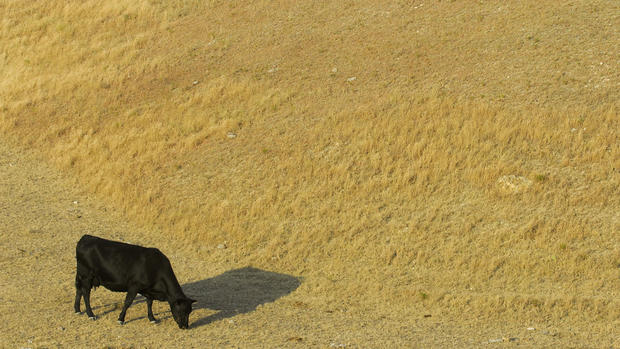Drought likely to hit you hard in the pocketbook
(CBS News) JONESTOWN, Texas - A government report says the drought gripping much of the U.S. is the largest since 1956, with more than half the nation experiencing moderate to extreme drought.
With no relief in sight, the arid conditions may soon start having a noticeable effect on the prices of everything from food to gasoline.
The biggest drought in more than half a century is leaving fields from Ohio to California dried up and desperate for rain.
"We've never seen a drought like this," Illinois Gov. Pat Quinn told reporters.
"You can see firsthand how depleted, how serious this matter is," Quinn continued, holding up an ear of dried-out corn.
U.S. drought most widespread since 1956
Drought conditions cover 80 percent of U.S.
Video: Relief in sight from historic drought?
The Department of Agriculture estimates that nearly 40 percent of the nation's corn crop is in poor condition, and Purdue University economist Chris Hurt says that's bound to have a ripple effect on the economy.
"There's no question that this is a major drought and it's going to cost us tens of billions of dollars," he observes.
Here's why: According to the USDA, corn accounts for more than 90 percent of feed grain production, so as the price of corn goes up, so does the cost of feeding and maintaining cattle. That could lead to higher prices for meat and dairy products in the grocery store, hitting consumers at an already tough economic time.
Hurt says beef prices alone could reach record levels and stay there well into 2015.
"That means that, out of our paychecks, we have to spend more on our family budget on food, and that means less spending in the general economy," he points out.
And that's not all.
You may also wind up paying for the drought at the gas pump, as corn prices drive up ethanol costs.
Businesses that depend on outdoor recreation could also feel the impact.
Beau Theriot says he's already noticed a dip in business at his restaurant on Lake Travis, in Jonestown, Texas, near Austin,where the water level has been falling.
"I'm afraid it's hurting other people worse than it's hitting me, but it still is necessary that we get business built back up, and having water in the lake will help that, for sure," Theriot says.
To see Anna Werner's report, click on the video in the player above.

